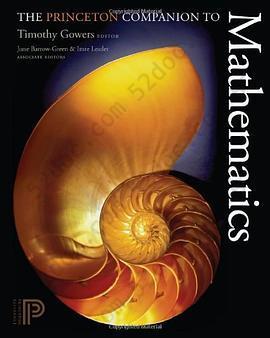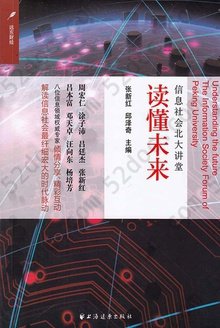注重体验与质量的电子书资源下载网站
分类于: 职场办公 编程语言
简介

The Princeton Companion to Mathematics 豆 9.5分
资源最后更新于 2020-07-28 14:45:10
作者:Gowers, Timothy (EDT)/ Barrow-Green, June (EDT)/ Leader, Imre (EDT)
出版社:Princeton University Press
出版日期:2008-01
ISBN:9780691118802
文件格式: pdf
标签: 数学 Mathematics 科普 数学史 Princeton Math ModernMath 数学文化
简介· · · · · ·
This is a one-of-a-kind reference for anyone with a serious interest in mathematics. Edited by Timothy Gowers, a recipient of the Fields Medal, it presents nearly two hundred entries, written especially for this book by some of the world's leading mathematicians, that introduce basic mathematical tools and vocabulary; trace the development of modern mathematics; explain essenti...
目录
TABLE OF CONTENTS:
Preface ix
Contributors xvii
Part I Introduction
I.1 What Is Mathematics About? 1
I.2 The Language and Grammar of Mathematics 8
I.3 Some Fundamental Mathematical Definitions 16
I.4 The General Goals of Mathematical Research 48
Part II The Origins of Modern Mathematics
II.1 From Numbers to Number Systems 77
II.2 Geometry 83
II.3 The Development of Abstract Algebra 95
II.4 Algorithms 106
II.5 The Development of Rigor in Mathematical Analysis 117
II.6 The Development of the Idea of Proof 129
II.7 The Crisis in the Foundations of Mathematics 142
Part III Mathematical Concepts
III.1 The Axiom of Choice 157
III.2 The Axiom of Determinacy 159
III.3 Bayesian Analysis 159
III.4 Braid Groups 160
III.5 Buildings 161
III.6 Calabi-Yau Manifolds 163
III.7 Cardinals 165
III.8 Categories 165
III.9 Compactness and Compactification 167
III.10 Computational Complexity Classes 169
III.11 Countable and Uncountable Sets 170
III.12 C*-Algebras 172
III.13 Curvature 172
III.14 Designs 172
III.15 Determinants 174
III.16 Differential Forms and Integration 175
III.17 Dimension 180
III.18 Distributions 184
III.19 Duality 187
III.20 Dynamical Systems and Chaos 190
III.21 Elliptic Curves 190
III.22 The Euclidean Algorithm and Continued Fractions 191
III.23 The Euler and Navier-Stokes Equations 193
III.24 Expanders 196
III.25 The Exponential and Logarithmic Functions 199
III.26 The Fast Fourier Transform 202
III.27 The Fourier Transform 204
III.28 Fuchsian Groups 208
III.29 Function Spaces 210
III.30 Galois Groups 213
III.31 The Gamma Function 213
III.32 Generating Functions 214
III.33 Genus 215
III.34 Graphs 215
III.35 Hamiltonians 215
III.36 The Heat Equation 216
III.37 Hilbert Spaces 219
III.38 Homology and Cohomology 221
III.39 Homotopy Groups 221
III.40 The Ideal Class Group 221
III.41 Irrational and Transcendental Numbers 222
III.42 The Ising Model 223
III.43 Jordan Normal Form 223
III.44 Knot Polynomials 225
III.45 K-Theory 227
III.46 The Leech Lattice 227
III.47 L-Functions 228
III.48 Lie Theory 229
III.49 Linear and Nonlinear Waves and Solitons 234
III.50 Linear Operators and Their Properties 239
III.51 Local and Global in Number Theory 241
III.52 The Mandelbrot Set 244
III.53 Manifolds 244
III.54 Matroids 244
III.55 Measures 246
III.56 Metric Spaces 247
III.57 Models of Set Theory 248
III.58 Modular Arithmetic 249
III.59 Modular Forms 250
III.60 Moduli Spaces 252
III.61 The Monster Group 252
III.62 Normed Spaces and Banach Spaces 252
III.63 Number Fields 254
III.64 Optimization and Lagrange Multipliers 255
III.65 Orbifolds 257
III.66 Ordinals 258
III.67 The Peano Axioms 258
III.68 Permutation Groups 259
III.69 Phase Transitions 261
III.70 p 261
III.71 Probability Distributions 263
III.72 Projective Space 267
III.73 Quadratic Forms 267
III.74 Quantum Computation 269
III.75 Quantum Groups 272
III.76 Quaternions, Octonions, and Normed Division Algebras 275
III.77 Representations 279
III.78 Ricci Flow 279
III.79 Riemann Surfaces 282
III.80 The Riemann Zeta Function 283
III.81 Rings, Ideals, and Modules 284
III.82 Schemes 285
III.83 The Schrödinger Equation 285
III.84 The Simplex Algorithm 288
III.85 Special Functions 290
III.86 The Spectrum 294
III.87 Spherical Harmonics 295
III.88 Symplectic Manifolds 297
III.89 Tensor Products 301
III.90 Topological Spaces 301
III.91 Transforms 303
III.92 Trigonometric Functions 307
III.93 Universal Covers 309
III.94 Variational Methods 310
III.95 Varieties 313
III.96 Vector Bundles 313
III.97 Von Neumann Algebras 313
III.98 Wavelets 313
III.99 The Zermelo-Fraenkel Axioms 314
Part IV Branches of Mathematics
IV.1 Algebraic Numbers 315
IV.2 Analytic Number Theory 332
IV.3 Computational Number Theory 348
IV.4 Algebraic Geometry 363
IV.5 Arithmetic Geometry 372
IV.6 Algebraic Topology 383
IV.7 Differential Topology 396
IV.8 Moduli Spaces 408
IV.9 Representation Theory 419
IV.10 Geometric and Combinatorial Group Theory 431
IV.11 Harmonic Analysis 448
IV.12 Partial Differential Equations 455
IV.13 General Relativity and the Einstein Equations 483
IV.14 Dynamics 493
IV.15 Operator Algebras 510
IV.16 Mirror Symmetry 523
IV.17 Vertex Operator Algebras 539
IV.18 Enumerative and Algebraic Combinatorics 550
IV.19 Extremal and Probabilistic Combinatorics 562
IV.20 Computational Complexity 575
IV.21 Numerical Analysis 604
IV.22 Set Theory 615
IV.23 Logic and Model Theory 635
IV.24 Stochastic Processes 647
IV.25 Probabilistic Models of Critical Phenomena 657
IV.26 High-Dimensional Geometry and Its Probabilistic Analogues 670
Part V Theorems and Problems
V.1 The ABC Conjecture 681
V.2 The Atiyah-Singer Index Theorem 681
V.3 The Banach-Tarski Paradox 684
V.4 The Birch-Swinnerton-Dyer Conjecture 685
V.5 Carleson's Theorem 686
V.6 The Central Limit Theorem 687
V.7 The Classification of Finite Simple Groups 687
V.8 Dirichlet's Theorem 689
V.9 Ergodic Theorems 689
V.10 Fermat's Last Theorem 691
V.11 Fixed Point Theorems 693
V.12 The Four-Color Theorem 696
V.13 The Fundamental Theorem of Algebra 698
V.14 The Fundamental Theorem of Arithmetic 699
V.15 Gödel's Theorem 700
V.16 Gromov's Polynomial-Growth Theorem 702
V.17 Hilbert's Nullstellensatz 703
V.18 The Independence of the Continuum Hypothesis 703
V.19 Inequalities 703
V.20 The Insolubility of the Halting Problem 706
V.21 The Insolubility of the Quintic 708
V.22 Liouville's Theorem and Roth's Theorem 710
V.23 Mostow's Strong Rigidity Theorem 711
V.24 The P versus NP Problem 713
V.25 The Poincaré Conjecture 714
V.26 The Prime Number Theorem and the Riemann Hypothesis 714
V.27 Problems and Results in Additive Number Theory 715
V.28 From Quadratic Reciprocity to Class Field Theory 718
V.29 Rational Points on Curves and the Mordell Conjecture 720
V.30 The Resolution of Singularities 722
V.31 The Riemann-Roch Theorem 723
V.32 The Robertson-Seymour Theorem 725
V.33 The Three-Body Problem 726
V.34 The Uniformization Theorem 728
V.35 The Weil Conjectures 729
Part VI Mathematicians
VI.1 Pythagoras (ca. 569 B.C.E.-ca. 494 B.C.E.) 733
VI.2 Euclid (ca. 325 B.C.E.-ca. 265 B.C.E.) 734
VI.3 Archimedes (ca. 287 B.C.E.-212 B.C.E.) 734
VI.4 Apollonius (ca. 262 B.C.E.-ca. 190 B.C.E.) 735
VI.5 Abu Ja'far Muhammad ibn Musa al-Khwarizmi (800-847) 736
VI.6 Leonardo of Pisa (known as Fibonacci) (ca. 1170-ca. 1250) 737
VI.7 Girolamo Cardano (1501-1576) 737
VI.8 Rafael Bombelli (1526-after 1572) 737
VI.9 François Viète (1540-1603) 737
VI.10 Simon Stevin (1548-1620) 738
VI.11 René Descartes (1596-1650) 739
VI.12 Pierre Fermat (160?-1665) 740
VI.13 Blaise Pascal (1623-1662) 741
VI.14 Isaac Newton (1642-1727) 742
VI.15 Gottfried Wilhelm Leibniz (1646-1716) 743
VI.16 Brook Taylor (1685-1731) 745
VI.17 Christian Goldbach (1690-1764) 745
VI.18 The Bernoullis (fl. 18th century) 745
VI.19 Leonhard Euler (1707-1783) 747
VI.20 Jean Le Rond d'Alembert (1717-1783) 749
VI.21 Edward Waring (ca. 1735-1798) 750
VI.22 Joseph Louis Lagrange (1736-1813) 751
VI.23 Pierre-Simon Laplace (1749-1827) 752
VI.24 Adrien-Marie Legendre (1752-1833) 754
VI.25 Jean-Baptiste Joseph Fourier (1768-1830) 755
VI.26 Carl Friedrich Gauss (1777-1855) 755
VI.27 Siméon-Denis Poisson (1781-1840) 757
VI.28 Bernard Bolzano (1781-1848) 757
VI.29 Augustin-Louis Cauchy (1789-1857) 758
VI.30 August Ferdinand Möbius (1790-1868) 759
VI.31 Nicolai Ivanovich Lobachevskii (1792-1856) 759
VI.32 George Green (1793-1841) 760
VI.33 Niels Henrik Abel (1802-1829) 760
VI.34 János Bolyai (1802-1860) 762
VI.35 Carl Gustav Jacob Jacobi (1804-1851) 762
VI.36 Peter Gustav Lejeune Dirichlet (1805-1859) 764
VI.37 William Rowan Hamilton (1805-1865) 765
VI.38 Augustus De Morgan (1806-1871) 765
VI.39 Joseph Liouville (1809-1882) 766
VI.40 Eduard Kummer (1810-1893) 767
VI.41 Évariste Galois (1811-1832) 767
VI.42 James Joseph Sylvester (1814-1897) 768
VI.43 George Boole (1815-1864) 769
VI.44 Karl Weierstrass (1815-1897) 770
VI.45 Pafnuty Chebyshev (1821-1894) 771
VI.46 Arthur Cayley (1821-1895) 772
VI.47 Charles Hermite (1822-1901) 773
VI.48 Leopold Kronecker (1823-1891) 773
VI.49 Georg Friedrich Bernhard Riemann (1826-1866) 774
VI.50 Julius Wilhelm Richard Dedekind (1831-1916) 776
VI.51 Émile Léonard Mathieu (1835-1890) 776
VI.52 Camille Jordan (1838-1922) 777
VI.53 Sophus Lie (1842-1899) 777
VI.54 Georg Cantor (1845-1918) 778
VI.55 William Kingdon Clifford (1845-1879) 780
VI.56 Gottlob Frege (1848-1925) 780
VI.57 Christian Felix Klein (1849-1925) 782
VI.58 Ferdinand Georg Frobenius (1849-1917) 783
VI.59 Sofya (Sonya) Kovalevskaya (1850-1891) 784
VI.60 William Burnside (1852-1927) 785
VI.61 Jules Henri Poincaré (1854-1912) 785 [Illustration credit: Portrait courtesy of Henri Poincaré Archives (CNRS,UMR 7117, Nancy)]
VI.62 Giuseppe Peano (1858-1932) 787
VI.63 David Hilbert (1862-1943) 788
VI.64 Hermann Minkowski (1864-1909) 789
VI.65 Jacques Hadamard (1865-1963) 790
VI.66 Ivar Fredholm (1866-1927) 791
VI.67 Charles-Jean de la Vallée Poussin (1866-1962) 792
VI.68 Felix Hausdorff (1868-1942) 792
VI.69 Élie Joseph Cartan (1869-1951) 794
VI.70 Emile Borel (1871-1956) 795
VI.71 Bertrand Arthur William Russell (1872-1970) 795
VI.72 Henri Lebesgue (1875-1941) 796
VI.73 Godfrey Harold Hardy (1877-1947) 797
VI.74 Frigyes (Frédéric) Riesz (1880-1956) 798
VI.75 Luitzen Egbertus Jan Brouwer (1881-1966) 799
VI.76 Emmy Noether (1882-1935) 800
VI.77 Wac?aw Sierpinski (1882-1969) 801
VI.78 George Birkhoff (1884-1944) 802
VI.79 John Edensor Littlewood (1885-1977) 803
VI.80 Hermann Weyl (1885-1955) 805
VI.81 Thoralf Skolem (1887-1963) 806
VI.82 Srinivasa Ramanujan (1887-1920) 807
VI.83 Richard Courant (1888-1972) 808
VI.84 Stefan Banach (1892-1945) 809
VI.85 Norbert Wiener (1894-1964) 811
VI.86 Emil Artin (1898-1962) 812
VI.87 Alfred Tarski (1901-1983) 813
VI.88 Andrei Nikolaevich Kolmogorov (1903-1987) 814
VI.89 Alonzo Church (1903-1995) 816
VI.90 William Vallance Douglas Hodge (1903-1975) 816
VI.91 John von Neumann (1903-1957) 817
VI.92 Kurt Gödel (1906-1978) 819
VI.93 André Weil (1906-1998) 819
VI.94 Alan Turing (1912-1954) 821
VI.95 Abraham Robinson (1918-1974) 822
VI.96 Nicolas Bourbaki (1935-) 823
Part VII The Influence of Mathematics
VII.1 Mathematics and Chemistry 827
VII.2 Mathematical Biology 837
VII.3 Wavelets and Applications 848
VII.4 The Mathematics of Traffic in Networks 862
VII.5 The Mathematics of Algorithm Design 871
VII.6 Reliable Transmission of Information 878
VII.7 Mathematics and Cryptography 887
VII.8 Mathematics and Economic Reasoning 895
VII.9 The Mathematics of Money 910
VII.10 Mathematical Statistics 916
VII.11 Mathematics and Medical Statistics 921
VII.12 Analysis, Mathematical and Philosophical 928
VII.13 Mathematics and Music 935
VII.14 Mathematics and Art 944
Part VIII Final Perspectives
VIII.1 The Art of Problem Solving 955
VIII.2 "Why Mathematics?" You Might Ask 966
VIII.3 The Ubiquity of Mathematics 977
VIII.4 Numeracy 983
VIII.5 Mathematics: An Experimental Science 991
VIII.6 Advice to a Young Mathematician 1000
VIII.7 A Chronology of Mathematical Events 1010
Index 1015
Preface ix
Contributors xvii
Part I Introduction
I.1 What Is Mathematics About? 1
I.2 The Language and Grammar of Mathematics 8
I.3 Some Fundamental Mathematical Definitions 16
I.4 The General Goals of Mathematical Research 48
Part II The Origins of Modern Mathematics
II.1 From Numbers to Number Systems 77
II.2 Geometry 83
II.3 The Development of Abstract Algebra 95
II.4 Algorithms 106
II.5 The Development of Rigor in Mathematical Analysis 117
II.6 The Development of the Idea of Proof 129
II.7 The Crisis in the Foundations of Mathematics 142
Part III Mathematical Concepts
III.1 The Axiom of Choice 157
III.2 The Axiom of Determinacy 159
III.3 Bayesian Analysis 159
III.4 Braid Groups 160
III.5 Buildings 161
III.6 Calabi-Yau Manifolds 163
III.7 Cardinals 165
III.8 Categories 165
III.9 Compactness and Compactification 167
III.10 Computational Complexity Classes 169
III.11 Countable and Uncountable Sets 170
III.12 C*-Algebras 172
III.13 Curvature 172
III.14 Designs 172
III.15 Determinants 174
III.16 Differential Forms and Integration 175
III.17 Dimension 180
III.18 Distributions 184
III.19 Duality 187
III.20 Dynamical Systems and Chaos 190
III.21 Elliptic Curves 190
III.22 The Euclidean Algorithm and Continued Fractions 191
III.23 The Euler and Navier-Stokes Equations 193
III.24 Expanders 196
III.25 The Exponential and Logarithmic Functions 199
III.26 The Fast Fourier Transform 202
III.27 The Fourier Transform 204
III.28 Fuchsian Groups 208
III.29 Function Spaces 210
III.30 Galois Groups 213
III.31 The Gamma Function 213
III.32 Generating Functions 214
III.33 Genus 215
III.34 Graphs 215
III.35 Hamiltonians 215
III.36 The Heat Equation 216
III.37 Hilbert Spaces 219
III.38 Homology and Cohomology 221
III.39 Homotopy Groups 221
III.40 The Ideal Class Group 221
III.41 Irrational and Transcendental Numbers 222
III.42 The Ising Model 223
III.43 Jordan Normal Form 223
III.44 Knot Polynomials 225
III.45 K-Theory 227
III.46 The Leech Lattice 227
III.47 L-Functions 228
III.48 Lie Theory 229
III.49 Linear and Nonlinear Waves and Solitons 234
III.50 Linear Operators and Their Properties 239
III.51 Local and Global in Number Theory 241
III.52 The Mandelbrot Set 244
III.53 Manifolds 244
III.54 Matroids 244
III.55 Measures 246
III.56 Metric Spaces 247
III.57 Models of Set Theory 248
III.58 Modular Arithmetic 249
III.59 Modular Forms 250
III.60 Moduli Spaces 252
III.61 The Monster Group 252
III.62 Normed Spaces and Banach Spaces 252
III.63 Number Fields 254
III.64 Optimization and Lagrange Multipliers 255
III.65 Orbifolds 257
III.66 Ordinals 258
III.67 The Peano Axioms 258
III.68 Permutation Groups 259
III.69 Phase Transitions 261
III.70 p 261
III.71 Probability Distributions 263
III.72 Projective Space 267
III.73 Quadratic Forms 267
III.74 Quantum Computation 269
III.75 Quantum Groups 272
III.76 Quaternions, Octonions, and Normed Division Algebras 275
III.77 Representations 279
III.78 Ricci Flow 279
III.79 Riemann Surfaces 282
III.80 The Riemann Zeta Function 283
III.81 Rings, Ideals, and Modules 284
III.82 Schemes 285
III.83 The Schrödinger Equation 285
III.84 The Simplex Algorithm 288
III.85 Special Functions 290
III.86 The Spectrum 294
III.87 Spherical Harmonics 295
III.88 Symplectic Manifolds 297
III.89 Tensor Products 301
III.90 Topological Spaces 301
III.91 Transforms 303
III.92 Trigonometric Functions 307
III.93 Universal Covers 309
III.94 Variational Methods 310
III.95 Varieties 313
III.96 Vector Bundles 313
III.97 Von Neumann Algebras 313
III.98 Wavelets 313
III.99 The Zermelo-Fraenkel Axioms 314
Part IV Branches of Mathematics
IV.1 Algebraic Numbers 315
IV.2 Analytic Number Theory 332
IV.3 Computational Number Theory 348
IV.4 Algebraic Geometry 363
IV.5 Arithmetic Geometry 372
IV.6 Algebraic Topology 383
IV.7 Differential Topology 396
IV.8 Moduli Spaces 408
IV.9 Representation Theory 419
IV.10 Geometric and Combinatorial Group Theory 431
IV.11 Harmonic Analysis 448
IV.12 Partial Differential Equations 455
IV.13 General Relativity and the Einstein Equations 483
IV.14 Dynamics 493
IV.15 Operator Algebras 510
IV.16 Mirror Symmetry 523
IV.17 Vertex Operator Algebras 539
IV.18 Enumerative and Algebraic Combinatorics 550
IV.19 Extremal and Probabilistic Combinatorics 562
IV.20 Computational Complexity 575
IV.21 Numerical Analysis 604
IV.22 Set Theory 615
IV.23 Logic and Model Theory 635
IV.24 Stochastic Processes 647
IV.25 Probabilistic Models of Critical Phenomena 657
IV.26 High-Dimensional Geometry and Its Probabilistic Analogues 670
Part V Theorems and Problems
V.1 The ABC Conjecture 681
V.2 The Atiyah-Singer Index Theorem 681
V.3 The Banach-Tarski Paradox 684
V.4 The Birch-Swinnerton-Dyer Conjecture 685
V.5 Carleson's Theorem 686
V.6 The Central Limit Theorem 687
V.7 The Classification of Finite Simple Groups 687
V.8 Dirichlet's Theorem 689
V.9 Ergodic Theorems 689
V.10 Fermat's Last Theorem 691
V.11 Fixed Point Theorems 693
V.12 The Four-Color Theorem 696
V.13 The Fundamental Theorem of Algebra 698
V.14 The Fundamental Theorem of Arithmetic 699
V.15 Gödel's Theorem 700
V.16 Gromov's Polynomial-Growth Theorem 702
V.17 Hilbert's Nullstellensatz 703
V.18 The Independence of the Continuum Hypothesis 703
V.19 Inequalities 703
V.20 The Insolubility of the Halting Problem 706
V.21 The Insolubility of the Quintic 708
V.22 Liouville's Theorem and Roth's Theorem 710
V.23 Mostow's Strong Rigidity Theorem 711
V.24 The P versus NP Problem 713
V.25 The Poincaré Conjecture 714
V.26 The Prime Number Theorem and the Riemann Hypothesis 714
V.27 Problems and Results in Additive Number Theory 715
V.28 From Quadratic Reciprocity to Class Field Theory 718
V.29 Rational Points on Curves and the Mordell Conjecture 720
V.30 The Resolution of Singularities 722
V.31 The Riemann-Roch Theorem 723
V.32 The Robertson-Seymour Theorem 725
V.33 The Three-Body Problem 726
V.34 The Uniformization Theorem 728
V.35 The Weil Conjectures 729
Part VI Mathematicians
VI.1 Pythagoras (ca. 569 B.C.E.-ca. 494 B.C.E.) 733
VI.2 Euclid (ca. 325 B.C.E.-ca. 265 B.C.E.) 734
VI.3 Archimedes (ca. 287 B.C.E.-212 B.C.E.) 734
VI.4 Apollonius (ca. 262 B.C.E.-ca. 190 B.C.E.) 735
VI.5 Abu Ja'far Muhammad ibn Musa al-Khwarizmi (800-847) 736
VI.6 Leonardo of Pisa (known as Fibonacci) (ca. 1170-ca. 1250) 737
VI.7 Girolamo Cardano (1501-1576) 737
VI.8 Rafael Bombelli (1526-after 1572) 737
VI.9 François Viète (1540-1603) 737
VI.10 Simon Stevin (1548-1620) 738
VI.11 René Descartes (1596-1650) 739
VI.12 Pierre Fermat (160?-1665) 740
VI.13 Blaise Pascal (1623-1662) 741
VI.14 Isaac Newton (1642-1727) 742
VI.15 Gottfried Wilhelm Leibniz (1646-1716) 743
VI.16 Brook Taylor (1685-1731) 745
VI.17 Christian Goldbach (1690-1764) 745
VI.18 The Bernoullis (fl. 18th century) 745
VI.19 Leonhard Euler (1707-1783) 747
VI.20 Jean Le Rond d'Alembert (1717-1783) 749
VI.21 Edward Waring (ca. 1735-1798) 750
VI.22 Joseph Louis Lagrange (1736-1813) 751
VI.23 Pierre-Simon Laplace (1749-1827) 752
VI.24 Adrien-Marie Legendre (1752-1833) 754
VI.25 Jean-Baptiste Joseph Fourier (1768-1830) 755
VI.26 Carl Friedrich Gauss (1777-1855) 755
VI.27 Siméon-Denis Poisson (1781-1840) 757
VI.28 Bernard Bolzano (1781-1848) 757
VI.29 Augustin-Louis Cauchy (1789-1857) 758
VI.30 August Ferdinand Möbius (1790-1868) 759
VI.31 Nicolai Ivanovich Lobachevskii (1792-1856) 759
VI.32 George Green (1793-1841) 760
VI.33 Niels Henrik Abel (1802-1829) 760
VI.34 János Bolyai (1802-1860) 762
VI.35 Carl Gustav Jacob Jacobi (1804-1851) 762
VI.36 Peter Gustav Lejeune Dirichlet (1805-1859) 764
VI.37 William Rowan Hamilton (1805-1865) 765
VI.38 Augustus De Morgan (1806-1871) 765
VI.39 Joseph Liouville (1809-1882) 766
VI.40 Eduard Kummer (1810-1893) 767
VI.41 Évariste Galois (1811-1832) 767
VI.42 James Joseph Sylvester (1814-1897) 768
VI.43 George Boole (1815-1864) 769
VI.44 Karl Weierstrass (1815-1897) 770
VI.45 Pafnuty Chebyshev (1821-1894) 771
VI.46 Arthur Cayley (1821-1895) 772
VI.47 Charles Hermite (1822-1901) 773
VI.48 Leopold Kronecker (1823-1891) 773
VI.49 Georg Friedrich Bernhard Riemann (1826-1866) 774
VI.50 Julius Wilhelm Richard Dedekind (1831-1916) 776
VI.51 Émile Léonard Mathieu (1835-1890) 776
VI.52 Camille Jordan (1838-1922) 777
VI.53 Sophus Lie (1842-1899) 777
VI.54 Georg Cantor (1845-1918) 778
VI.55 William Kingdon Clifford (1845-1879) 780
VI.56 Gottlob Frege (1848-1925) 780
VI.57 Christian Felix Klein (1849-1925) 782
VI.58 Ferdinand Georg Frobenius (1849-1917) 783
VI.59 Sofya (Sonya) Kovalevskaya (1850-1891) 784
VI.60 William Burnside (1852-1927) 785
VI.61 Jules Henri Poincaré (1854-1912) 785 [Illustration credit: Portrait courtesy of Henri Poincaré Archives (CNRS,UMR 7117, Nancy)]
VI.62 Giuseppe Peano (1858-1932) 787
VI.63 David Hilbert (1862-1943) 788
VI.64 Hermann Minkowski (1864-1909) 789
VI.65 Jacques Hadamard (1865-1963) 790
VI.66 Ivar Fredholm (1866-1927) 791
VI.67 Charles-Jean de la Vallée Poussin (1866-1962) 792
VI.68 Felix Hausdorff (1868-1942) 792
VI.69 Élie Joseph Cartan (1869-1951) 794
VI.70 Emile Borel (1871-1956) 795
VI.71 Bertrand Arthur William Russell (1872-1970) 795
VI.72 Henri Lebesgue (1875-1941) 796
VI.73 Godfrey Harold Hardy (1877-1947) 797
VI.74 Frigyes (Frédéric) Riesz (1880-1956) 798
VI.75 Luitzen Egbertus Jan Brouwer (1881-1966) 799
VI.76 Emmy Noether (1882-1935) 800
VI.77 Wac?aw Sierpinski (1882-1969) 801
VI.78 George Birkhoff (1884-1944) 802
VI.79 John Edensor Littlewood (1885-1977) 803
VI.80 Hermann Weyl (1885-1955) 805
VI.81 Thoralf Skolem (1887-1963) 806
VI.82 Srinivasa Ramanujan (1887-1920) 807
VI.83 Richard Courant (1888-1972) 808
VI.84 Stefan Banach (1892-1945) 809
VI.85 Norbert Wiener (1894-1964) 811
VI.86 Emil Artin (1898-1962) 812
VI.87 Alfred Tarski (1901-1983) 813
VI.88 Andrei Nikolaevich Kolmogorov (1903-1987) 814
VI.89 Alonzo Church (1903-1995) 816
VI.90 William Vallance Douglas Hodge (1903-1975) 816
VI.91 John von Neumann (1903-1957) 817
VI.92 Kurt Gödel (1906-1978) 819
VI.93 André Weil (1906-1998) 819
VI.94 Alan Turing (1912-1954) 821
VI.95 Abraham Robinson (1918-1974) 822
VI.96 Nicolas Bourbaki (1935-) 823
Part VII The Influence of Mathematics
VII.1 Mathematics and Chemistry 827
VII.2 Mathematical Biology 837
VII.3 Wavelets and Applications 848
VII.4 The Mathematics of Traffic in Networks 862
VII.5 The Mathematics of Algorithm Design 871
VII.6 Reliable Transmission of Information 878
VII.7 Mathematics and Cryptography 887
VII.8 Mathematics and Economic Reasoning 895
VII.9 The Mathematics of Money 910
VII.10 Mathematical Statistics 916
VII.11 Mathematics and Medical Statistics 921
VII.12 Analysis, Mathematical and Philosophical 928
VII.13 Mathematics and Music 935
VII.14 Mathematics and Art 944
Part VIII Final Perspectives
VIII.1 The Art of Problem Solving 955
VIII.2 "Why Mathematics?" You Might Ask 966
VIII.3 The Ubiquity of Mathematics 977
VIII.4 Numeracy 983
VIII.5 Mathematics: An Experimental Science 991
VIII.6 Advice to a Young Mathematician 1000
VIII.7 A Chronology of Mathematical Events 1010
Index 1015







